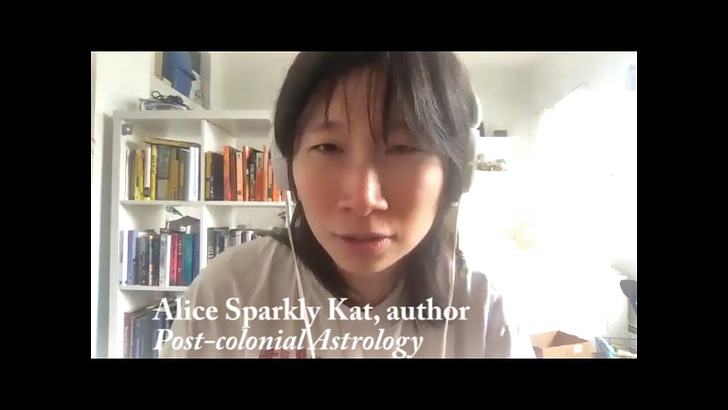vol. 3 issue 27
Greetings,
At long last, the promised interview with Alice “Ace” Sparkly Kat, author of Post-colonial Astrology: Reading the Planets through Capital, Power, and Labor.
It’s an important piece in our examination of the sentiment that it’s easier to imagine the end of the world than it is the end of Capitalism, the end of the hierarchy we have invested in, yet which cannibalizes us all in the end.
I tried to keep the conversation focused on the book’s innovative way of viewing the deleterious impacts of hierarchy, being mindful of not alienating my non-astrology audience.
However, for context, just know that as far as astrology goes, Ace deconstructs what the various planets in our Ptolemaic solar system (the 7 heavenly bodies we can see with our naked eye) have been assigned to represent pre- and post-Roman Empire.
She asks us to consider whether the assignments are actually helpful to us as we develop relationships with the greater forces in our lives, with ourselves, and with one another. If these assigned meanings are not helpful, why not, and what other interpretations make sense to us instead?
This interview is an excellent follow-on to the podcast I did with author Brian Muraresku about his book, The Immortality Key, a New York Times bestseller linking psychedelics to Jesus, but also to the way the Roman Empire quashed access to the Eleusinian mystery ceremonies where psychedelics were featured, and where women priestesses guided initiates to the world beyond, the one that once we are reassured exists, imparts meaning to our lives lived here.
From my perspective, it was at that moment in history that whatever evil there is in the universe that seeks to stamp out the glimmers of human liberation and continual reunion with the Source, found its foot soldiers in the Roman Empire.
They trashed the Republic, stamped out Antiquity’s emerging democracy, orchestrated the hostile take-over of the Eleusinian mysteries, and established hegemony through the Empire’s subsidiary, the Roman Catholic Church, which sold to us the Eucharist as a sanitized version of the mystery that was more like a bait and switch: “Come for the communion, be separated from your true self by the holy hierarchy!”
Yes, the Roman Empire engineered sewers, sanitation, roads and running water, but did so on the backs of slaves and others, all of whom they forbade to partake in the woodland Eleusinian mystery ceremonies that the Eucharist is based in. Thus, the Roman imperialists achieved subjugation by separating the people from themselves, orienting them instead toward the Roman leadership, or as Ace says, “towards capital,” and away from their internal governor, the one that naturally regulates one’s longing for commune with the Greater Source.
In other words, an orientation towards capital/the capitol is unnatural. But we’ve been conditioned to think it is the only state of existence to which we can aspire, if not through the church, then certainly through our system of Capitalism packaged as the only way to ensure democracy.
Is there any wonder, then, why we feel so much anxiety and depression here in the US? We know instinctively we are not living in our natural state, but we don’t know how or why. It’s been so long, across so many generations, that we’ve been conditioned to accept that we can only access higher truths — and liberation — if someone packages these things and distributes them to us first.
And all the while, we’re told we’re free, simply because we are Americans, or that as Christians, we will be “saved” because we are obedient. Obedience is not freedom.
These are the kinds of questions and considerations that make Ace’s book not just culturally relevant, but important. As I say in this interview, to one degree or another, as long as we do not consider the origins of our stories, then we are all living a lie, even if we are not liars.
Race and astrology as forms of ‘magical thinking’
Even if you never give a glancing thought to the stars, it is possible to consider what Ace posits, namely, that just as astrology is a language of symbols and myth-making, so too is race a product of fantabulous mythologizing — a form of “magical thinking” says Ace — using agreed upon symbols to construct stories that ultimately turn into policies, which then become oppressions, because the symbology supports only those empowered by what the symbols are said to represent.
Or, as Ace writes in her book, “Both astrology and race are social constructs and are rooted in the circulations of culture.” Ace’s work suggests that those who insist upon seeing racism as merely an “interpersonal phenomenon, rather than composite matrices of domination that limit access and freedom,” are in essence abnegating their own powers of imagination, instead submitting themselves to the will of “the powers that be” rather than take ownership of their lives.
Which is why I love this book as an American cultural critic first, an astrologer second.
It challenged me to re-consider how we use and relate to symbols as ubiquitous as the Sun, for example, which we equate symbolically with power. The Sun is the source that allows everything to exist. It is also used to justify total surveillance, power over, and extermination of what is “dark”, as in dark-skinned. While I might never have explicitly attributed these meanings to the Sun, I have never thought to challenge how they are implied when we accept them without questioning their etymology.
For example, as Ace points out, royalty throughout history has always equated the Sun with gold. They have also tended to hoard that gold, burying it in the ground. Thus, royalty and gold, as well as the power of the city-state where the gold was buried, have been implied by the Sun.
Following a global gold mining boom in the late 19th century, the mineral was circulated briefly as a currency up until the first half of the 20th before being taken out of circulation and once again buried in the ground in vaults, primarily beneath London and New York, where it remains.
Once again, the implication is that gold is therefore artificially scarce, and so artificially exclusive, all while still being associated with the Sun. The result is that the Sun is considered both life-sustaining, but also exclusive. This helps justify at whatever conscious level it might be to some, why some humans “deserve” access to resources, and some do not. It is also therefore, justification at whatever conscious level, for why some humans “deserve” to live and some do not. Ergo, racism, and in the extreme, genocide.
Original Sin: hierarchy v. white supremacy
One question which came up in our conversation was the notion of Original Sin in the context of which came first, hierarchy or white supremacy.
The logic I follow, derived from the years spent mapping our national conscience through this publication and podcast series, suggests that hierarchy came first as a default mode, and all manner of subjugation hence flows from it, including white supremacy, and thus racism. Is this the correct framework? I don’t know.
Either way, I state unequivocally that for us to believe racism is merely a “personal” perspective and not an institutionally enforced one is to believe a pernicious lie. Racism is real because our policies continue to acquiesce to it. They do so, because our foundational beliefs, represented by the symbols our hierarchy has collectively agreed represent “reality”, command them to.
Regardless of whether white supremacy supersedes hierarchy or if it is the other way around, our reasons for its existence must be interrogated. Indeed, philosopher and professor George Yancy writes that racism is our ontological reality.
That is why patching “fixes” like Affirmative Action, for example, onto our policies without first asking ourselves the underlying rationale for the policies that hold the system in place, is ultimately useless.
Racism’s damage to the collective is real. Tinkering incessantly with our broken system without addressing the precepts it was founded upon is a waste of time when we have no time to waste.
Lies sanctified by society without question, such as that the Sun equates with some of us being worth the time and energy, and others not, also wastes human resources.
To not question our systems of faith-in-action is literally a matter of life or death.
The infinite resource of mind
Regarding the heavenly spheres anew caused me to do some thinking out loud in the interview, and I appreciate Ace’s patience as I considered familiar things as though for the first time, verbalizing both my epiphanies and my misgivings.
This interview with Alice Sparkly Kat once again stresses for readers of docu-mental the notion we’ve been exploring, that we stand to lose far too much power the more we allow others -- the news media, the church, the digital giants, any cult that seeks to brand us -- to aggregate our attention and distract us from knowing and using the power of our own minds and imagination.
How much gatekeeping to the Beyond do we actually need?
The question returns us to how the Roman Catholic Church used the language and the ceremonies of the people Roman emperors wanted to subjugate. It took the same words about liberation and hope for the life beyond, and used them to keep people enslaved.
Reorienting away from capital, from Capitalism, does not mean poverty or whatever dismal and demonic scenario the hierarchical top spooks us with. It simply means we become the gatekeepers to our imagination, the only infinitely renewable resource on earth, and the gateway to what lies beyond this life. It means we re-orient to ourselves.
If there is a lesson here, it is that perhaps it is easier to imagine the end of Capitalism than it is the end of the world. That in fact, to not do so is to ensure the end of the world. That we’ve not imagined such a future for ourselves collectively is a fait accompli of the hierarchy who stands to lose access to our hearts, minds, and lives if we do imagine a future that is not mediated.
That is why toppling the hierarchy begins and ends with our imagination, and why we must guard it as though it is as precious as the Sun.
The liberation of a post-truth world
What these past five years in the US have shown us is that we live in a post-truth world. At first, I saw this as terrifying. But now, I find it liberating.
We can untether ourselves from truths that are lies, but not the consequences of our actions taken as a result of adhering to the lies as truths.
That we have or have not done something will always be the fact of any matter. Saying something didn’t happen when it did is not changing our mythology, it’s lying.
But we can change our shared truths, our national myths, and thus help shape our actions and their consequences, by understanding that cultural precepts like race, like astrological symbols, like political parties, like gender (yes, gender — one’s capacity for sexual reproduction is biological, gender is not), are nothing more than agreed upon stories. That our cultural truths might be “fabricated” or “made up” does not negate their power nor its meaning, since they are attempts to describe what is ineffable – the eternal Real of existence.
Instead, the more we consciously participate in infusing our symbols with meaning, the more meaningful they will be, and to more people.
We are making it all up, but whatever we choose to create, it will matter.
And that is the truth.
Peace,
Whitney
The podcast for this is linked at the top.
The video is here.
Time stamps/chapters of podcast are below.
About that comment on Jung’s racism and sexism in this podcast…
One thing which came up in my conversation with Ace was her take that Carl Jung, considered the father of Depth Psychology and the world’s most “famous astrologer”, was racist and sexist. Many would agree with her, while others might suggest he was simply a product of his cultural moment.
Either way, he certainly made statements about the planets and the unconscious that were categorically binary, and made questionable comments about the nature of the unconscious, even though as Ace’s own investigations show, such statements were not always justified.
I think it is worth having a more thorough discussion about this, since both Jung and Sigmund Freud respectively were, along with William James, progenitors of American psychology and psychiatry. Since this is about mapping the american states of mind, I am looking into who can come on the podcast to address the larger context and considerations of Ace’s statement. More to come…
W
Timestamps for Alice Sparkly Kat and Post-colonial Astrology:
0:00 Intro and discussion about the name Alice Sparkly Kat
5:00 Myth-making depends on who controls the language that frames access to the archetypes
8:18 Race is not real, it is not biological; begins with religion.
12:30 The “traditional” mythology of the Sun
16:45 Why do we consider astrology as “western”?
21:00 The exciting phenomenon of deconstructing astrology while also using it to build community
31:00 Is astrology spiritual or habitual?
39:00 Mental health definitions “are made thought a middle class (male) white lens”
48:00 Colonizing the moon for “real”
52:00 Astrology’s appeal to fascists and neo-liberals
59:00 Resisting the colonization of our minds
1:06:00 The liberation of living a life not “received” but examined













Share this post